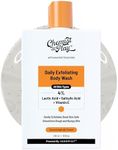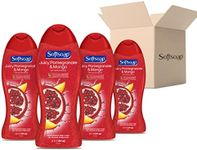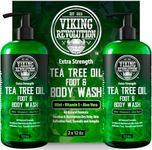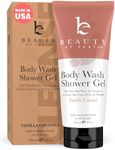Buying Guide for the Best Antibacterial Body Washes
Choosing the right antibacterial body wash can make a big difference in your daily hygiene routine. The best product for you will depend on your skin type, any sensitivities you may have, and your personal preferences for scent and texture. It's important to understand what makes a body wash 'antibacterial' and how different features can affect your experience and results. By focusing on a few key specifications, you can find a body wash that keeps your skin clean, healthy, and comfortable.Active Antibacterial IngredientThe active antibacterial ingredient is the component in the body wash that helps kill or reduce bacteria on your skin. Common ingredients include triclosan, tea tree oil, or benzalkonium chloride. This is important because it determines how effective the body wash is at reducing bacteria. Some ingredients are synthetic, while others are natural. If you have sensitive skin or allergies, you may want to choose a product with a milder, natural antibacterial agent. For those who need stronger protection, such as athletes or people prone to body acne, a more potent ingredient may be suitable. Always check the label and consider your skin's needs when choosing.
Skin Type CompatibilitySkin type compatibility refers to how well the body wash matches your skin's needs, whether you have dry, oily, sensitive, or normal skin. This is important because the wrong formula can cause irritation, dryness, or breakouts. Body washes for dry skin often include moisturizing ingredients, while those for oily or acne-prone skin may have oil-control or exfoliating properties. If you have sensitive skin, look for hypoallergenic or fragrance-free options. Think about your skin's usual behavior and pick a body wash that supports its health.
Moisturizing PropertiesMoisturizing properties refer to the ability of the body wash to hydrate your skin while cleansing. This is important because some antibacterial agents can be drying. Body washes with added moisturizers like glycerin, aloe vera, or shea butter help maintain your skin's natural moisture balance. If your skin feels tight or flaky after washing, you may need a more hydrating formula. If you have naturally oily skin, a lighter, less moisturizing wash may be better. Choose based on how your skin feels after showering.
FragranceFragrance is the scent added to the body wash, which can range from strong perfumes to subtle or unscented options. This is important because some people are sensitive or allergic to fragrances, and strong scents can linger on the skin. If you enjoy a fresh scent after showering, you might prefer a fragranced body wash. If you have sensitive skin or prefer not to mix scents with other products, look for fragrance-free or naturally scented options. Your personal preference and any sensitivities should guide your choice.
Lather and TextureLather and texture describe how the body wash feels and foams when used. Some people prefer a rich, foamy lather, while others like a gel or creamier texture. This is important because it affects your shower experience and how easily the product spreads on your skin. If you like a luxurious, bubbly wash, look for products that mention rich lather. If you have sensitive skin, a gentle, creamy texture may be less irritating. Think about what feels best to you and how you like to use your body wash.
Dermatologist Tested or ApprovedDermatologist tested or approved means the product has been evaluated by skin experts for safety and effectiveness. This is important if you have sensitive skin, allergies, or specific skin conditions. Products with this label are generally less likely to cause irritation. If you have concerns about skin reactions, look for this assurance on the packaging. For most people, it's an extra layer of confidence, but for those with skin issues, it can be a deciding factor.


















